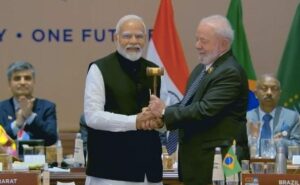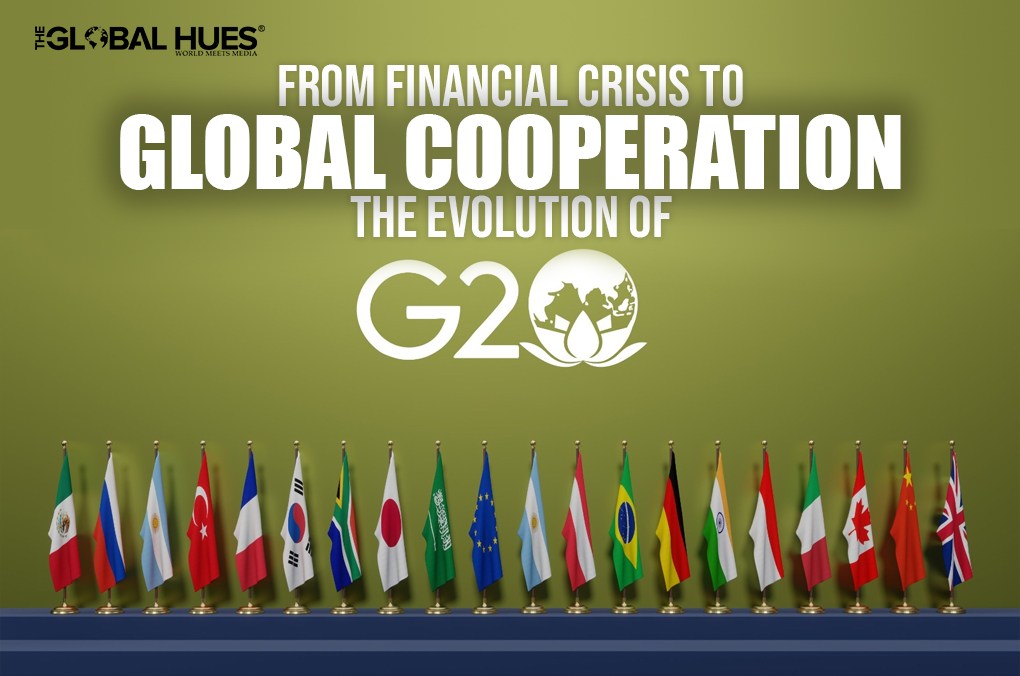On 10 September 2023, the three-day G20 Summit in New Delhi ended on a high note as Prime Minister Narendra Modi gave Brazil the rotational Presidency. At the summit, the World leaders, under the theme of “One Earth, One Family, One Future”, discussed various themes like climate and energy, food security, development, digitalization and health.
While many nations predicted that the G20 summit in India would fail, India has proved all those critics wrong. US State Department official spokesperson Matthew Miller lauded India, calling it a success.
While addressing the 104th episode of the monthly radio programme Mann ki Baat, Prime Minister Narendra Modi highlighted two world records that were created in the course of strengthening public participation in G20. One was the participation of 1.25 lakh students from 800 schools in the G20 quiz in Varanasi, the other was the planning of 200 G-20-related events in 60 cities across the country.
Before we dig deeper into how the G20 summit in India was successful, we first need to understand the history associated with it.
History Of G20 Summit
The G20, also known as The Group of Twenty, was founded in 1999 after the Asian financial crisis of 1997-98. It was then a forum for the Finance Ministers and Central Bank Governors to discuss global economic and financial issues. The heads of State participated in the forum for international economic cooperation.
The first G-20 Summit took place in 2008 in Washington D.C., the United States to discuss financial markets and the world economy. The follow-up meeting happened in 2009 in London, the United Kingdom where countries reached a consensus to blacklist those countries that refused to cooperate in addressing tax evasion and avoidance. The third meeting, which took place in the same year in Pittsburgh established G20 as a major decision-making body on matters relating to the world economy.
Currently, G20 consists of Argentina, Australia, Brazil, Canada, China, India, Indonesia, Italy, France, Germany, Japan, Saudi Arabia, South Africa, Republic of Korea, Mexico, Russia, Türkiye, the United Kingdom, the United States, the African Union and the European Union. These members represent two-thirds of the world’s population, 85 per cent of the global GDP and 75 per cent of global trade.
List of Summits Held After 2009
2010: Canada
2010: South Korea
2011: France
2012: Mexico
2013: Russia
2014: Australia
2015: Turkey
2016: China
2017: Germany
2018: Argentina
2019: Japan
2020: Saudi Arabia
2021: Italy
2022: Indonesia
2023: India
In the initial days, the focus of discussion in these forums was broad microeconomic policy, but now it includes trade, climate change, sustainable development, energy, environment, anti-corruption, and other issues.
The Rotating G20 Presidency
You may be surprised to know but G20 doesn’t have a permanent leader.
And that is why, each year, a different country from the G20 assumes the presidency. All the member countries decide who leads the presidency through a rotation system. There are 19 countries in the G20, and they split into five groups based on where they are in the world. Each year, they choose a country from one of these groups to be the leader. This rotation system started when South Korea was in charge.
In 2023, India had the presidency. It has now been passed on to Brazil by India. Next year, Brazil will host the G20 summit.
India’s ‘Most Ambitious’ G20 Presidency
-
G20 is now G21!
“With your consent, before we proceed with further proceedings, I invite the Chairperson of the African Union to take their place as a permanent member of the G-20,” these were the words of PM Modi when he invited Azali Assoumani, President of the Union of Comoros and chair of the AU to take the seat as the permanent member of G20.
The African Union is now the official member of the G20. In recent months, Prime Minister Modi has been actively promoting the inclusion of the African Union as a member of the G20. The idea originally emerged following the ‘Voice of the Global South’ Summit in January 2023, attended by the majority of the African Union’s 55 member nations. However, the initiative gained momentum in early June when PM Modi wrote to his counterparts among the G20 member countries, urging them to grant full membership to the African Union.
-
The India-Middle East-Europe Economic Corridor (IMEC)
During the G-20, an MOU was signed between the Governments of India, the US, Saudi Arabia, the EU, the UAE, France, Germany, and Italy- to establish an India- Middle East- Europe Economic corridor (IMEC). This corridor is envisioned to be a network of transport corridors, including railway and sea lines, and it will aid economic growth through integration between Asia, the Arabian Gulf, and Europe.
-
Sustainable Development Goals
Narendra Modi urged G-20 development ministers to create blueprints for sustainable development that can be achieved by 2030 and the development should be women-led. He emphasised increasing investment to achieve the SDGs and solutions to address the matter of ‘debt risk’ which other countries face.
He also stressed on gender equality and women’s empowerment as necessary to achieve SDGs. He also urged to reform the multilateral financial institutions so that finance is available to people who need it. The 7-year SDGs plan has three main goals:
- To harness data and digital technology for development
- To secure fair transactions
- To invest in women-led development
Other areas of focus under acceleration progress on SDG include strengthening global health, eliminating hunger and malnutrition, delivering quality education and implementing one health approach.
-
Technological Development
In G-20, India prioritised the growth of digital public infrastructure, emerging technology, cybersecurity, digital skilling and economy. PM Modi projected India as a tech leader of the Global South. India put forth the proposal that if all the countries share technologies, better systems can be created.
The World Bank also lauded India’s Digital Public Infrastructure in a G20 document, saying that DPI has had a transformative impact. The document also mentioned that India has achieved this significant milestone in just six years, which otherwise would have taken five decades.
What were India’s G20 Priorities?
-
Green Development, Climate, Finance, and LiFE
At the G20 Summit 2023, India prioritised climate change, technology, and energy transitions. The issue of climate change cuts across industries, sectors, and society. India emphasised a behaviour-based movement that draws upon ancient sustainable traditions to nudge customers to adopt environmentally conscious practices.
-
Accelerated, Inclusive And Resilient Growth
India focused on those areas that can bring structural transformation. The country aimed to integrate the MSMEs into global trade, promote labour rights and welfare, address global skill gaps and build inclusive agricultural value chains and food systems.
-
Technological Transformation & Digital Public Infrastructure
India believes in a human-centric approach to technology that facilitates knowledge sharing in areas like digital public infrastructure, financial inclusion, and tech-enabled development in sectors from agriculture to education.
-
Women-Led Development
India also used the G20 forum to highlight growth and development and focus on women’s empowerment and representation. It also included focusing on bringing women to the fore, especially in leading positions for boosting socio-economic development and achieving the SDGs.
New Delhi Consensus/Declaration
The leaders of the G20 summit arrived at a joint consensus called the G20 New Delhi Leader’s Declaration. Here are some of the key points:
- It condemns terrorism as a serious threat to international peace, stating that all acts of terrorism are criminal and unjustifiable.
- It highlights the need to promote equitable economic growth and ensure macroeconomic and financial stability, with a focus on protecting vulnerable populations.
- It places emphasis on achieving strong and sustainable economic growth, advancing progress toward sustainable development goals, supporting environmentally friendly development, and revitalizing international cooperation.
- The Declaration emphasises that the G20 members are dedicated to promoting unrestricted, open, and fair trade in agriculture, food, and fertilizers, and to avoid imposing export restrictions.
- G20 nations pledge to strengthen the global health system, enhance the resilience of health systems, and promote the development of climate-resilient, low-carbon health systems in collaboration with multilateral development banks (MDBs).
- The Declaration also highlights the importance of aligning financial flows with climate goals while expanding financial support, capacity-building, and technology transfer, with a specific focus on the priorities and needs of developing countries.
This year’s G-20 will be known for its impact. Why?
The New Delhi declaration, a 34-page document with 112 outcomes, has caught everyone by surprise. With a total of 112 outcomes and presidency documents, India has more than tripled the output compared to previous presidencies. India outperformed previous G20 Presidencies by a significant margin, producing a total of 112 outcomes and presidency documents. In comparison, Indonesia in 2022 had 50, Italy in 2021 had 65, Saudi Arabia in 2020 had 30, Japan in 2019 had 29, Argentina in 2018 had 33, and Germany in 2017 had 22 outcomes during their respective presidencies.
All these achievements clearly highlight that India not only handled the G20 presidency well but has set a new standard for G20 success.
Summing Up

The G20 Summit in India has come to an end. The PM of India has presented the gavel to Brazil as the country prepares to assume the presidency. However, India will still hold the responsibility till November 2023 as Brazil will officially take the helm on December 1st this year. PM Modi has proposed holding a virtual G20 meeting in late November as India’s presidency nears its conclusion. This meeting would serve as an opportunity for members to revisit the topics discussed and agreements made during the summit.
“We want greater participation of the emerging countries in the decision-making process of the World Bank and International Monetary Fund. The unbearable foreign debt of the poorest countries needs to be addressed,” said Brazil’s President Luiz Inacio Lula da Silva while addressing assembled delegates.




